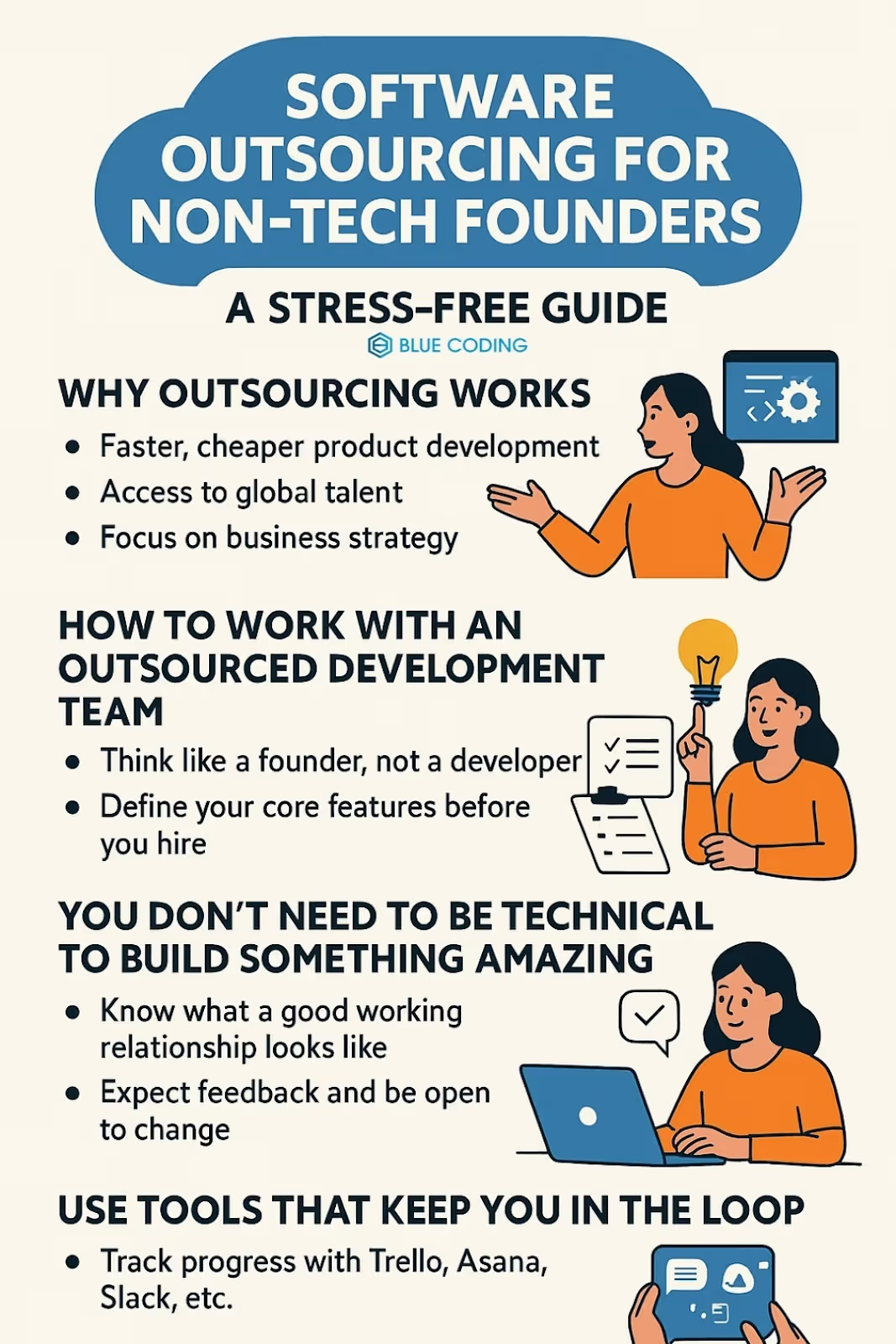No tech background? No problem. Learn how non-technical founders can successfully outsource software development with nearshore partners and stay in control every step of the way.


If you’ve got a great business idea but no idea how to code or manage a development team, you’re not alone and you’re not at a disadvantage. Some of today’s most successful startups were launched by founders who didn’t come from a tech background. What they had wasn’t technical knowledge, but a clear vision, the ability to make decisions, and the willingness to learn just enough to stay in the loop. The good news is, you don’t need to become a developer overnight or dive into a world of confusing jargon to bring your product to life. You just need a smart, structured approach to software outsourcing, one that keeps you in control, helps you communicate your goals clearly, and lets the experts handle the technical heavy lifting without leaving you feeling lost. This nearshore outsourcing guide is here to walk you through the process of non-tech founders outsourcing in simple, straightforward language.
Nearshore software outsourcing makes it easier for non-tech founders to turn their ideas into real products; faster, cheaper, and with help from experts who know what they’re doing. Instead of spending months trying to build your own team or learning to code, you can partner with experienced developers who already have the right tools, processes, and technical skills in place. Even better, outsourcing opens the door to global talent. You’re not limited to hiring people in your city or country as you can find skilled professionals around the world, often at much more affordable rates. This means you can stay focused on your business strategy, marketing, and growth while trusted developers take care of the tech side. It’s a smart way to move forward without getting stuck in the details.
Your role isn’t to know every line of code. Your job is to clearly define the problem your product solves and how users should interact with it. Start by writing out your idea in simple language. Describe the user journey. What happens first? What should the experience feel like? This kind of clarity is more valuable than technical specs, especially when working with an outsourced team. It helps developers see the purpose behind your product, not just the feature list.
One mistake many non-tech founders outsourcing people make is trying to build everything at once. But more features don’t mean more value. Before outsourcing, identify your minimum viable product (MVP). These are the essential features your product needs to work and deliver value to early users. Focus on building something small and useful first. You’ll save time, money, and learn much faster from real user feedback.
That’s totally doable. Many founders start with outsourcing to get their MVP off the ground, then hire their own team once the product gains traction. If this is your plan, let your outsourced team know. They can structure the code and documentation in a way that makes the transition smooth. Ask them to keep the code clean, write proper documentation, and include walkthroughs so your future team can pick things up easily.
The most important thing to remember is that being a non-tech founder isn’t a limitation. Your value lies in your vision, your insight into the market, and your ability to steer the product in the right direction. Outsourcing helps you build that product without trying to do everything yourself. With the right mindset, a clear plan, and a reliable team, you can turn your idea into a fully working product—without ever touching a line of code.
The best outsourced teams don’t just build. They collaborate. They ask smart questions, offer better alternatives, and treat your product like something they care about. That kind of partnership can save you time, reduce rework, and result in a better final product. If your team just says “yes” to everything without digging deeper, they might not be thinking long-term. Look for teams that push back constructively or suggest improvements and that’s a good sign.
Once development starts, you’ll likely discover that some ideas work better than others in practice. Maybe a feature feels clunky or users react differently than expected. That’s normal. A good outsourcing team will share feedback with you and suggest changes. Stay open. The goal is to create something useful, not to stick to an original plan just for the sake of it.
You don’t need to learn GitHub or complex coding platforms to stay involved. Tools like Trello, Asana, Notion, and Slack can give you visibility into what’s being worked on, without needing to touch the code. Ask your outsourcing partner to set up a simple project dashboard so you can track progress and share feedback easily.

Not all outsourcing teams are the same. Some act like true partners. Others just follow instructions without offering much input. You want a team that understands business goals, asks questions, and communicates clearly. You don’t need to understand every tool they use. But you should feel confident they can turn your idea into reality.
When choosing a team or agency, look for:
▪︎ Strong communication skills
▪︎ Experience with startups or MVPs
▪︎ A transparent development process
▪︎ Willingness to explain technical decisions
▪︎ Positive reviews or case studies
Just as there are great outsourcing partners, there are also risky ones. If a team can’t explain what they’re doing in a way you understand, it’s a sign they may not be the best fit for a non-tech founder. Be cautious if you notice:
▪︎ Overpromising on timelines
▪︎ Vague or overly technical answers
▪︎ No portfolio or past client references
▪︎ Poor communication during early calls
▪︎ No clear project management structure
Software needs maintenance, even after it goes live. You’ll need someone to fix bugs, roll out updates, and keep things running smoothly. This helps you avoid getting stuck later with a product you can’t maintain. Before you sign any contract, ask:
▪︎ Will they provide post-launch support?
▪︎ Can you keep working with them long-term?
▪︎ If not, how will they hand off the code and documentation?
If you’ve read this nearshore outsourcing guide this far, you’re already ahead of the curve. At Blue Coding, we specialize in helping non-technical founders bring their ideas to life without the overwhelm. If you’re still validating your concept or even if you have a full roadmap ready to go, our team is here to guide you through every step with clarity, honesty, and a focus on real results. Let’s talk about how we can make your project happen. Contact us today for a free discovery call with us!
Subscribe to our blog and get the latest articles, insights, and industry updates delivered straight to your inbox